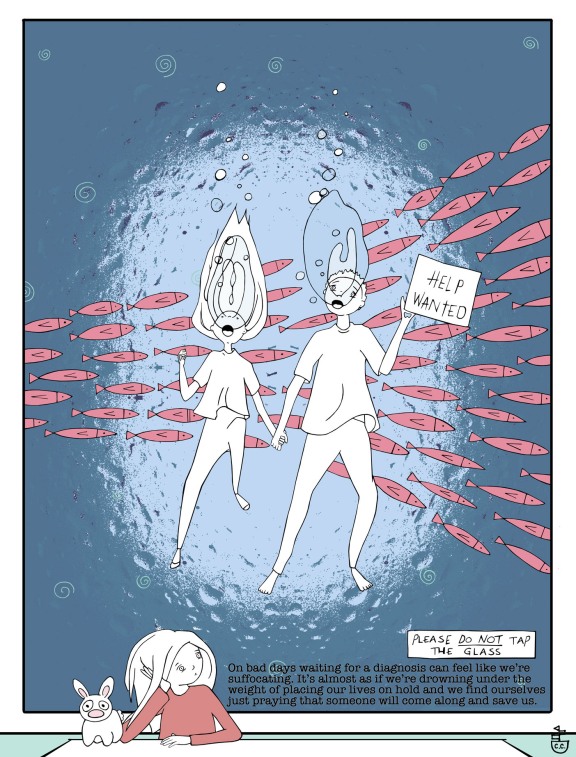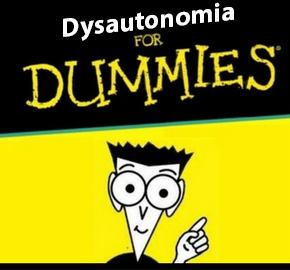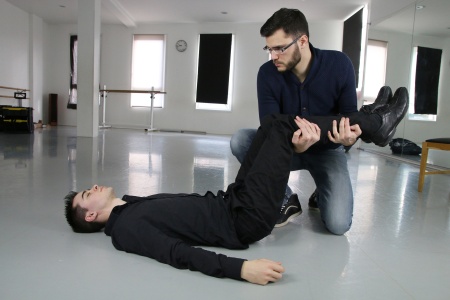Todays Saturday Submissions is brought to you by MeggioMum A.K.A Heather, who lives with Pots and EDS, be sure to check out her wonderful blog about ‘Two cents from a Midwest Mom’, HERE.
_____________________________________
Potsy Mamas: What We’re Hiding
No, I’m not talking about marijuana, though that would definitely be an interesting article. I’m actually talking about coping with chronic illness while raising a family. Perhaps you’ve heard of Disautonomia, Postural Orthostatic Tachycardia Syndrome (POTS), or Ehlers-Danlos Syndrome. Perhaps you haven’t. But these conditions are very real, and being a mom of four (soon to be five) while living with them is a surreal experience full of both suffering and beauty.
Imagine for a moment that, like every mother on the planet, you have more things to do in a day than are physically possible to accomplish. Now imagine trying to tackle that when your body feels heavy like you’re wading through thick mud, and coffee only makes the feeling worse. You’re exhausted like you’ve just run a marathon… ALL THE TIME. Walking up the stairs is like mountain climbing without oxygen. You have to constantly write yourself notes and set alarms on your phone because your memory is swiss cheese. Complex situations are overwhelming because your brain is in a fog, like when you first wake up in the morning, except it never goes away. The mere act of standing makes your heart jump in your throat, and the smallest movements can dislocate a rib or hyperextend a knee. And you are in significant pain every waking moment.
What happens when you live like this every day is both heartbreaking and inspiring. A series of things start to unfold. The first thing to go is your house. Dishes and laundry pile up, as does random clutter everywhere. You forget to clean the cat box and don’t have the energy to mow the lawn. Your house starts to look like an episode of Hoarders and you’re too ashamed to invite people over or even let your kid’s friends inside to play.
Then goes your self esteem. You blame yourself for all the things you know you should be doing. You feel lazy and worthless. Thoughts creep into your mind like “I’m not trying hard enough” “I’m such a burden” and “My family must be so disappointed in me.” You curse your body for not working right, and feel resentment towards both yourself and towards healthy people who live more mainstream lives. Your marriage suffers, both physically and emotionally, and you start to tell yourself that your spouse would be happier without you.
The guilt and self-blame are the worst when it comes to your children. You want to give them the world, and instead they don’t even bother to ask if you’ll take them to the park because they know that pained look in your eye all too well. You teach your children to be self-sufficient and independent; more out of necessity than anything else. You are proud that your teens can cook dinner, wash their own clothes, and fix their own bikes. You love how your younger kids can quietly entertain themselves outside in the fresh air without you hovering over them. But you also know that their childhood is flying by at lightning speed while you’re laying in bed trying not to throw up.
Then comes the judgement squad. Doctors not familiar with your condition, random people on the street, your kid’s teachers, coworkers, sometimes even your own family members. Everyone has an opinion on how severe your illness is and how you should be handling it. A lot of people don’t even believe your condition is real because you look “normal” on the outside. Your slurred speech and shaky movements means you sometimes get mistaken for an alcoholic or drug addict, and then treated with open disdain and discrimination.
Some people will be sympathetic, but insist you’ll be cured if you would just take more ginseng, or stop eating gluten, or do more yoga. My personal favorite is when they tell you to think positive and visualize yourself healthy.
I am a strong believer in homeopathy, clean eating, healthy exercise, and so on. But none of these things are magic cures that will stabilize the blood flow to my brain and keep my joints from dislocating. None of these things will keep my autonomic nervous system from misfiring like an electrical short. This is what leads to the final stage: the mask.
You start hiding your condition as best you can from the world. You grit your teeth and smile through the dislocations and spasms. When someone asks what’s wrong, you tell them you’re “just a little tired” instead of telling the truth. People get tired of hearing about your symptoms and start to tune you out. You avoid social interaction as much as possible, and start lying to cover up for it. (“Oh I’m sorry I missed the meeting, I had a flat tire”). You completely shut down in stressful situations because everyday life is already stressful enough, and you just can’t bear any more. You decide it is so much easier to put on the normal facade than wasting energy trying to make everyone understand. (Because 80% of them never will.)
I am trapped inside this body like a butterfly in a cocoon, except I don’t get to break free and fly.
There is an odd beauty to it though. This purgatory of inbetween health- not sick enough to be disabled, but not healthy enough to be normal- is like slowing down and living your life in stop motion. You learn to appreciate tiny moments like the sun warming your skin, the crinkle of smile in your daughter’s eyes, the earthy flavor of a hot cup of tea. You appreciate the people who stick by your side, and love them fiercely for it. You learn to let go of the things that don’t matter; like messy hair, dirty kids, and judgemental people. You learn to slow down and just breathe.
We are moms (and dads) worth knowing.
__________________________________________________
Thanks so much to Heather for submitting this post today, does this relate to you? How do you find juggling parenting and family life with chronic illness? If you relate, please leave a comment or consider following the directions below and submitting your own post to share!
——— Wanna Be Part of Saturday Submissions?———-
All you have to do is tell us a little about yourself and write a blog post (Any word count) in relation to your chronic illness, or how a relation/friend/patient with an illness affects or interacts with you, etc. all welcome!
You can include photos (preferably your own, if found online be sure to add links to where you found them)
Be sure to add links to your social media accounts so people can link back to you OR You can write it anonymously if you like just be sure to put your details in the email so I can respond to you personally 🙂
You can send your submissions to: irishpotsies@gmail.com

























